Essays
Essays
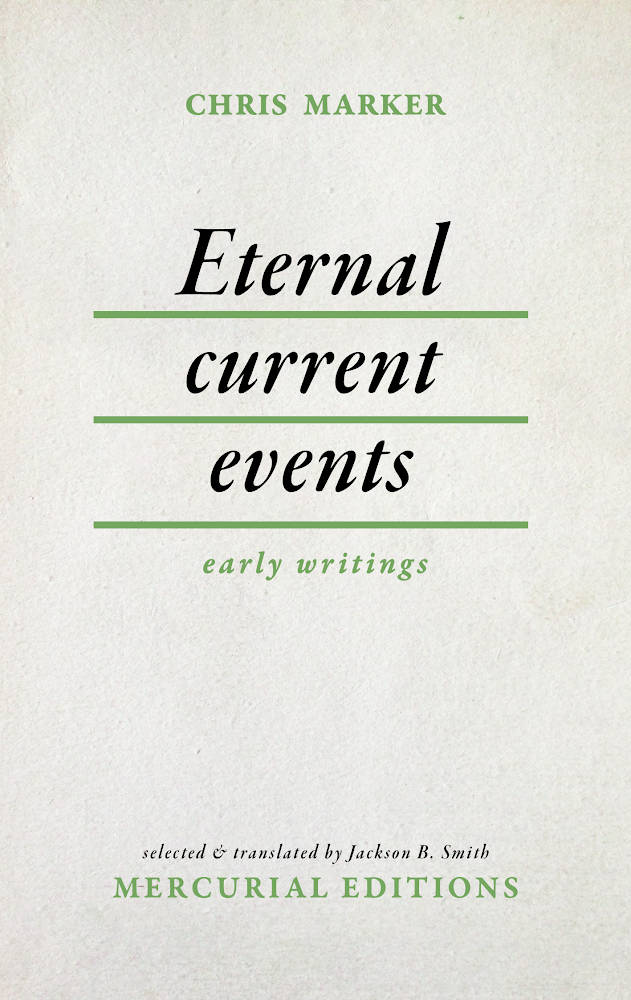
Eternal Current Events: Early Writings
Chris Marker, Jackson B. Smith
Before making his first films in the 1950s, Chris Marker was a regular contributor to the Paris-based magazine Esprit from 1946 to 1952. Unbound by genre or form, Marker's pieces range from short stories, essays, poems, and reviews to fabricated reportage and invented news affairs, all gemmed with the hallmarks of his style: a blurring of reality and imagination, a wry sense of humor, a sustained political engagement, and, of course, a limitless curiosity for animal life.
Eternal current events marks the first time these exemplary works are available in English, published in an adapted facsimile of the original periodical. In these short selections, what one encounters is less a past life before his turn toward cinema than a preamble to his celebrated body of work. Moving images did not replace Marker’s production as a writer but were incorporated into it. Before the “imaginary films” there were “imaginary current events”; before the travels through time in La Jetée there was a bulletin rethinking the psychogeography of the around-the-world trip; and before the musings on a Japanese temple consecrated to cats in Sans Soleil, there was a summary report on the theological implications of the 1952 Parisian Cat Fair. Marker did not just begin his career as a writer, he remained one throughout his life.
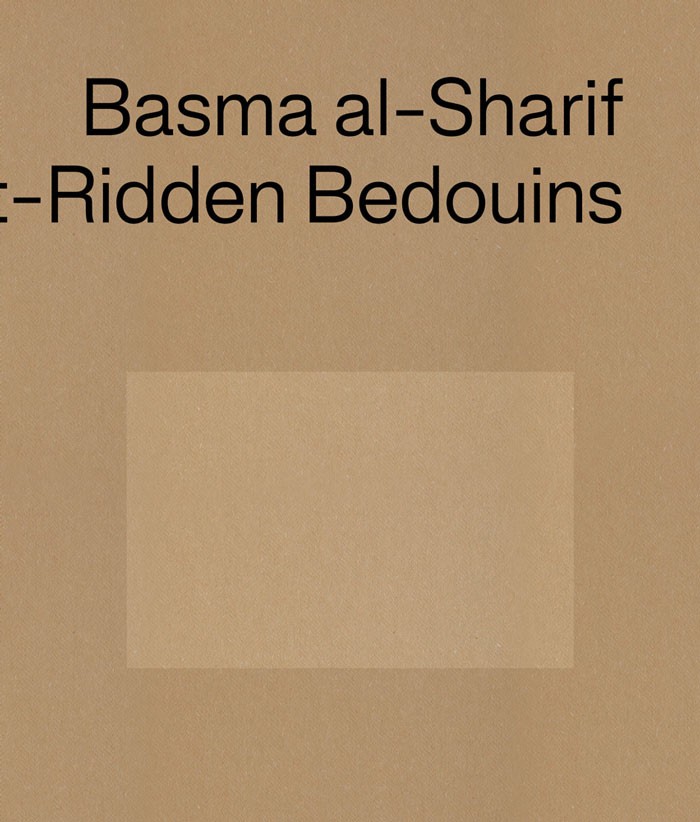
Semi-Nomadic Debt-Ridden Bedouins
Semi-Nomadic Debt-Ridden Bedouins offers an in-depth look at nearly two decades of artistic output by the Palestinian artist and filmmaker Basma al-Sharif. Retracing her practice from recent works back to her earliest experiments, the book provides an original overview of how her visual language and conceptual concerns have evolved over time.
Basma al-Sharif's films and installations navigate the unstable terrains of displacement, colonialism, and representation—often shaped by the ongoing reality of the occupation of Palestine. Through a rich selection of images and curatorial essays, the monograph highlights the layered political and cinematic frameworks within which her works are embedded.
Also included are two newly commissioned literary contributions: a fictional piece by Karim Kattan that resonates with the themes of place and estrangement, and a conversation between al-Sharif and the artist Diego Marcon, in which they reflect on shared affinities, artistic processes, and their long-standing dialogue. Blurring the personal and the political, the real and the imagined, Semi-Nomadic Debt-Ridden Bedouins captures the complexity and urgency of al-Sharif's artistic journey.
Texts by Basma al-Sharif, Karim Kattan, Diego Marcon, et al.
Basma al-Sharif (born 1983 in Koweit) is a Palestinian artist working in cinema and installation. She developed her practice nomadically between the Middle East, Europe, and North America and is currently based in Berlin. Her practice looks at cyclical political conflicts and confronts the legacy of colonialism through satirical, immersive, and lyrical works.
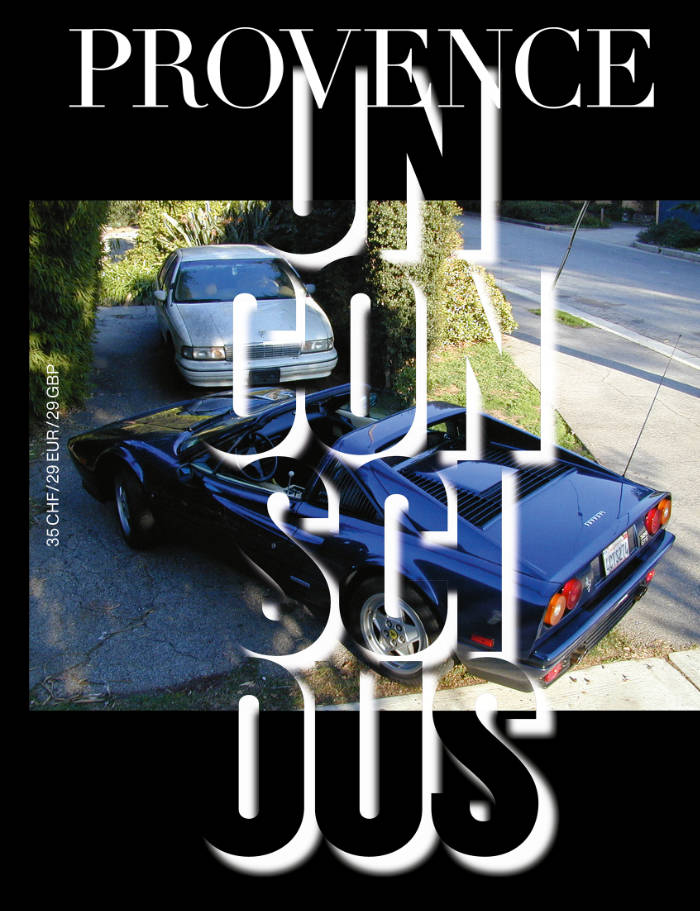
PROVENCE UNCONSCIOUS
PROVENCE UNCONSCIOUS deep dives into the cosmological pool that shapes the collective unconscious and takes a look at the relevance of Jung's ideas in relation to contemporary art and fashion.
PROVENCE UNCONSCIOUS draws inspiration from the Zurich-based office's proximity to the C.G. Jung Institute in Küsnacht—recently and notably visited by Pamela Anderson, who also appears in the publication. PROVENCE UNCONSCIOUS focuses on the work of three US-American artists—Mike Kelley, Matt Mullican, and Jason Rhoades—whose practices orbit around the themes of psychoanalysis and the unconscious. The issue also features collaged analog photographs of Laura Langer's spiral paintings, and a manuscript-style dream archive: over 30 hand-written or drawn submissions by artists, curators, jungians, and writers. Additional sections include, among many other things, jewelry by Bernhard Schobinger, photographs by Calla Henkel and Max Pitegoff, and a curatorial exploration of Emma Jung—analyst and wife of C.G. Jung—shedding light on the often-overlooked feminine legacy within Jungian thought.
PROVENCE UNCONSCIOUS didn't include any cooking recipes. And no, PROVENCE is not a magazine—but if it were, it would probably be the most radical one among its contemporary art peers.
Edited by Tobias Kaspar, Paolo Baggi, Samuel Haitz, Nina Hollensteiner, Claire Shiying Li, Veronika Dorosheva, Tatjana Hub.
Contributions by Pamela Anderson, Nina Hollensteiner & Claire Shiying Li, Forrest Bess, Matt Mullican, Mike Kelley, Valerie Smith, Delcy Morelos, Jimmy Raskin, Petra von bechtolsheim, Elizabeth leuenberger, Laura Langer, Bernhard Schobinger, Sophie Gogl, Susan Hiller, Calla & Max Pitegoff, Emma Jung, Rebecca Ackroyd, Korakrit Arunanondchai, Claire Shiying Li, Séverine Heizmann, Olga Fröbe-Kapteyn, Raphael Gygax, Stefano Carpani, Sabrina Tarasoff lITeRaTURe, Leda Bourgogne, Olamiju Fajemisin, Veronika Dorosheva, Lera Polivanova, Edgars Gluhovs.
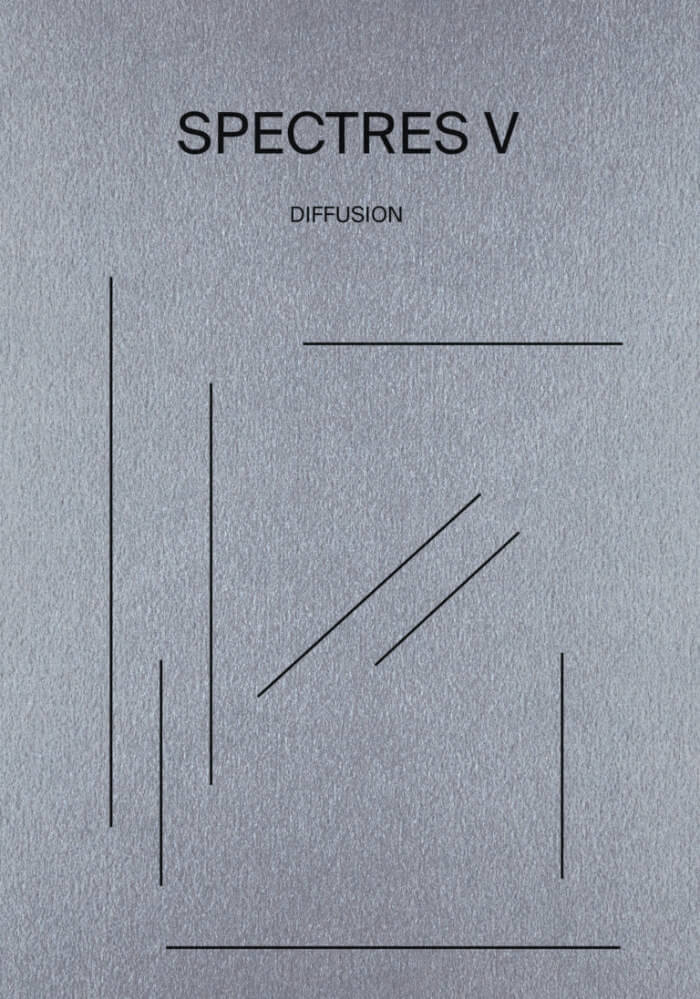
Spectres #05 – Diffusion
François J. Bonnet, Bartolomé Sanson
The fifth issue of the annual publication dedicated to sound and music experimentation, co-published by Shelter Press and Ina GRM – Groupe de Recherches Musicales, on the theme of diffusion and dissemination.
In a 1955 pamphlet entitled Seven Years of Musique Concrète, Jacques Poullin wrote:
"[...] sound projection in a concert hall is a logical extension of the concerns of the Groupe de Recherches de Musique Concrète and requires its technicians to properly study multiple aspects of the problems of sonorisation that are often neglected and to date have been almost exclusively the preserve of 'public address' technicians".
From the very beginning, fixed media electroacoustic music in its various guises faced a significant challenge: that of how it could be shared with the public. Even before it was distributed in the form of records, musique concrète, having first been transmitted on radio, soon turned to the concert stage. From the time of its birth, a twofold question was posed: What strategy of diffusion could be used for this music which involves no live performers? But also, how could it make use of existing systems of sound amplification without losing its singular nature, making sure to preserve its own particularities? Identified very early on, these questions have lost none of their pertinence some seventy years later.
Under pressure from the cultural industries and faced with a largely commercially-driven standardisation of formats, it is important today to reaffirm both the singular nature of experimental electroacoustic practices, and the possibilities these practices open up beyond standards and rules.
This calls for an exploration of the vast domain of sound creation in which, here and there, ideas, concepts, and sometimes new works appear that fully embrace the question of the deployment of sound, its dissemination and its expansion. An exploration focussed on the listening experience—a fundamentally musical experience—but adopting a critical approach which may sometimes call into question traditional ways of sharing and listening to sound, the status of listener and creator, and which may even challenge the acoustic integrity of venues and the legitimacy of diffusion systems.
Such are the questions to be addressed here. Sketching out the contours of what is quite obviously a huge subject, this volume, drawing upon a wide variety of points of view, experiences, and ideas, hints at an entire critical apparatus that remains to be developed and consolidated, but is crucial given the primordial importance of the theme of dissemination. For dissemination is the transitional stage par excellence, the uncertain stage that sits between creation and reception while at the same time determining both. It is a critical stage, yet one that is often neglected or, as Poullin says, left to a technical intermediary who may impose conditions entirely exogenous to questions of music and listening.
For these reasons, it seems more necessary than ever to return to the experience of sounds, to once again listen attentively to their trajectories, their diffraction in space, their emergence and their disappearance. To get to grips with the mysteries of their deployment so as to reaffirm that this deployment is essential to them.
Edited by François J. Bonnet and Bartolomé Sanson.
Contributions by Marja Ahti, Scott Arford, Nicolas Debade, Michael Gatt, Tim Ingold, Rolf Julius, Jules Négrier, John Richards, Marina Rosenfeld, Hildegard Westerkamp, Randy Yau.
Spectres is an annual publication dedicated to sound and music experimentation, co-published by Shelter Press and Ina GRM – Groupe de Recherches Musicales.
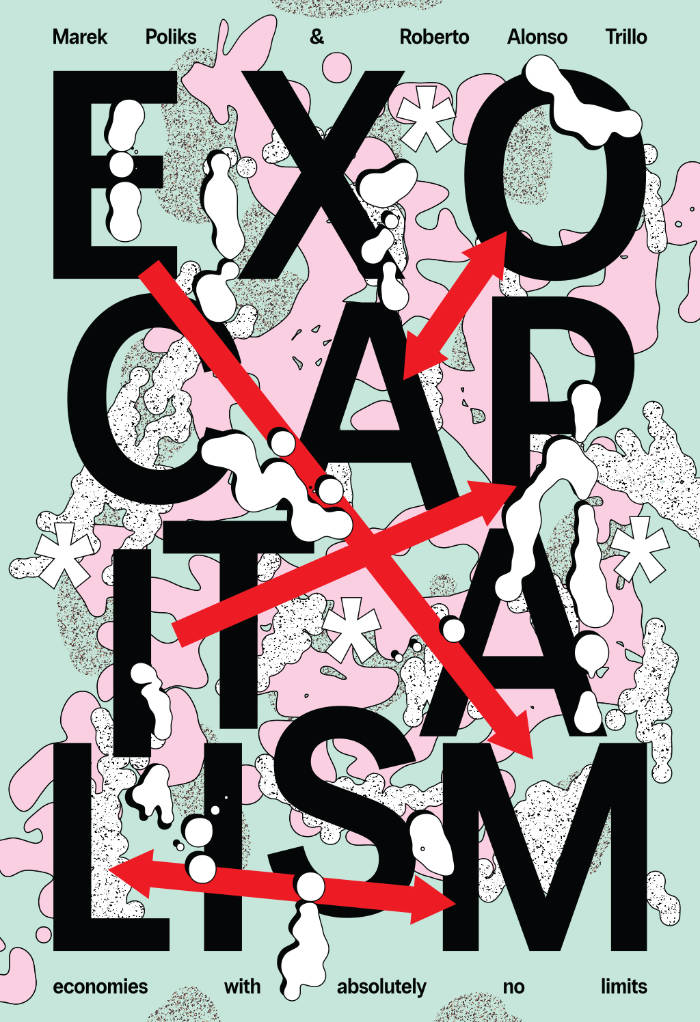
Exocapitalism – Economies with absolutely no limits
Roberto Alonso Trillo, Marek Poliks
A rigorous and mind-blowing account of the dynamics of capitalism today through an in-depth exposition of software, speculative finance, and the highest scales of arbitrage.
At the centre of Marek Poliks and Roberto Alonso Trillo's argument is the idea that capital does not belong to humans, it belongs to—and is governed by—itself. Traditional economic theory struggles to keep up with the rapid rate of acceleration, and this book steps in to address this:
"The critical orthodoxy is slowing; it's tired, it's not especially good at the internet, it's probably never manned a Starbucks counter or an anonymous cubicle. Its younger adepts—though digitally native—are chronically underemployed, unavailable, drowning in the student debt (or student opportunity cost) required for entry into the critical apparatus. Few have any patience for the numbing slop-speak of the LinkedIn economy, the libertarian enclave of forex and HFT and memecoins, the quarter-zip depravity of employment at the charnel houses of McKinsey or Deloitte or Accenture, the blazingly random mood-swings of venture capital that lubricate all of the above. This impatience is—in the parlance of the above—a blocker: it means that the critical apparatus underestimates the power of the software economy, struggles to articulate the morphological density of digitally-realized capitalism, comprehensively ignores the functional death of labor, and doesn't understand scale."
Introduction by Charles Mudede.
Afterword by Alex Quicho.
"A masterpiece... Nick Land for adults."
— 0nty
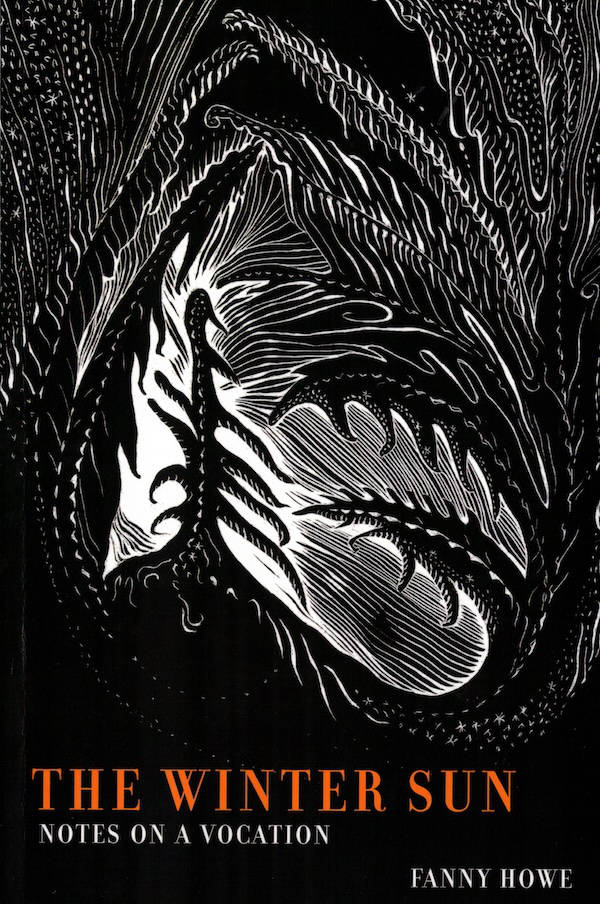
The Winter Sun
Fanny Howe's richly contemplative The Winter Sun is a collection of essays on childhood, language, and meaning by one of America's most original contemporary poets.
Through a collage of reflections on people, places, and times that have been part of her life, Howe shows the origins and requirements of "a vocation that has no name." She finds proof of this in the lives of others—Jacques Lusseyran, who, though blind, wrote about his inner vision, surviving inside a concentration camp during World War II; the Scottish nun Sara Grant and Abbé Dubois, both of whom lived extensively in India where their vocation led them; the English novelists Antonia White and Emily Brontë; and the fifth-century philosopher and poet Bharthari. With interludes referring to her own place and situation, Howe makes this book into a Progress rather than a memoir.
The Winter Sun displays the same power as found in her highly praised collection of essays, The Wedding Dress, a book described by James Carroll as an "unflinching but exhilarating look at real religion, the American desolation, a woman's life, and, always, the redemption of literature."
Fanny Howe is the author of more than twenty books of poetry and prose. She has won a fellowship from the Guggenheim Foundation and an award from the Academy of Arts and Letters.
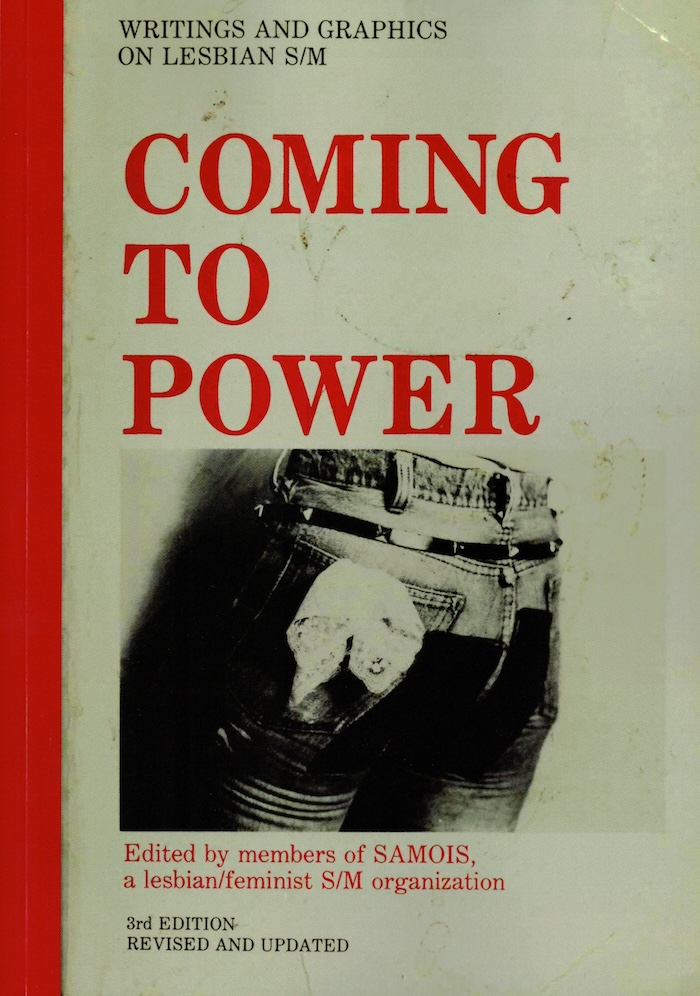
Coming To Power: writings and graphics on lesbian s/m
[reprint] a founding work of lesbian BDSM originally published in 1981.
Coming to Power is more than an attempt to put sex back into lesbian politics. It is an attempt to show, through stories, graphics and analysis, just how political lesbian sex really is. It is an attempt to remind all of us that we must continue our fight to define sexual relations in our own terms as something valid and important. And it’s the best thing that has been published on feminist theory/practice in a long, long time. So let’s go for that long-awaited walk on the wild side.
Samois was a lesbian feminist BDSM organization based in San Francisco that existed from 1978 to 1983. It was the first lesbian BDSM group in the United States.[1] It took its name from Samois-sur-Seine, the location of the fictional estate of Anne-Marie, a lesbian dominatrix character in Pauline Réage's erotic novel Story of O, who pierces and brands O. The co-founders were writer Pat Califia, who identified as a lesbian at the time, Gayle Rubin, and sixteen others.
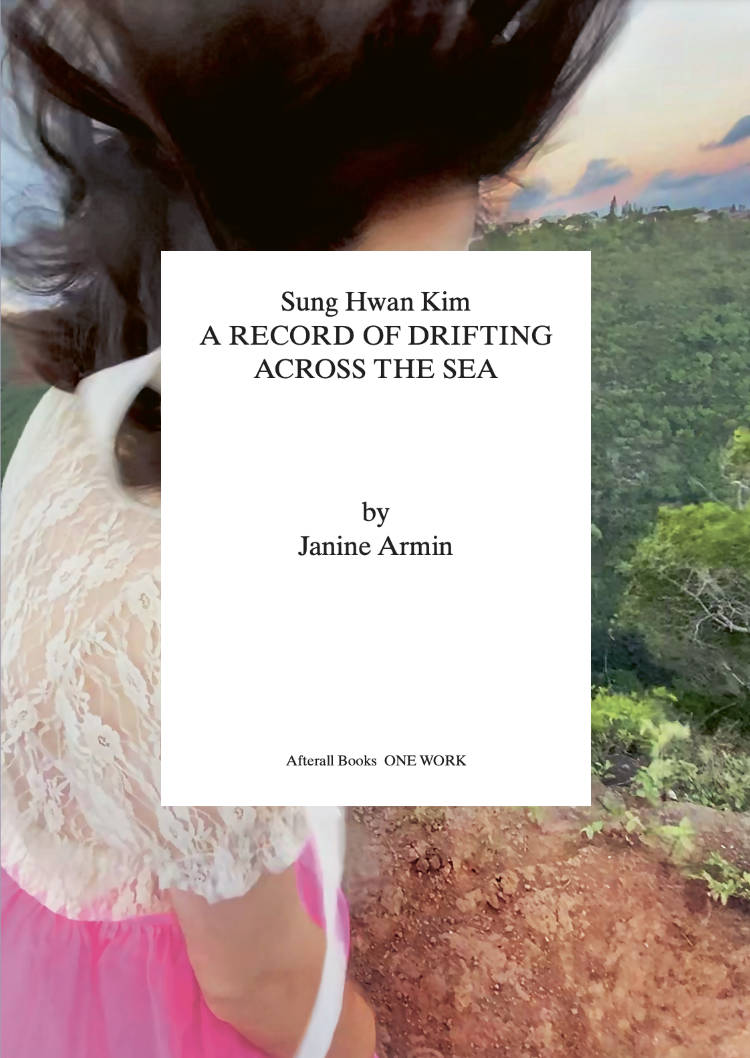
Sung Hwan Kim: A Record of Drifting Across the Sea
A richly illustrated exploration of Sung Hwan Kim’s complex record of migrant stories, displacement and belonging, border-crossings and translation.
In A Record of Drifting Across the Sea (2017–), Sung Hwan Kim looks at histories of migration. The artist parses the traces –archival and bodily – left by undocumented Korean migrants who came to the US by way of Hawai’i at the turn of the twentieth century, and ponders over their impact on other migrant and indigenous communities. As an ongoing film and installation series, comprising two chapters and a third in progress, A Record unsettles the limits of the ‘one work’ with its distributive, open-ended and collaborative nature.
In this speculative inquiry, Janine Armin explores each chapter in Kim’s multi-layered work as a mycelial network of feelers entangling and extending the wider work in-process. Engaging history through embodiment, folklore and myth, as much as through archival material, Kim navigates and crosses the boundaries between displacement and belonging. Focusing on the artist’s attempt to escape from representation, Armin illuminates and attends to the different stories and non-sovereign ways of being together towards which his work points us.
This title is part of the One Work book series, which focuses on artworks that have significantly changed the way we understand art and its history.
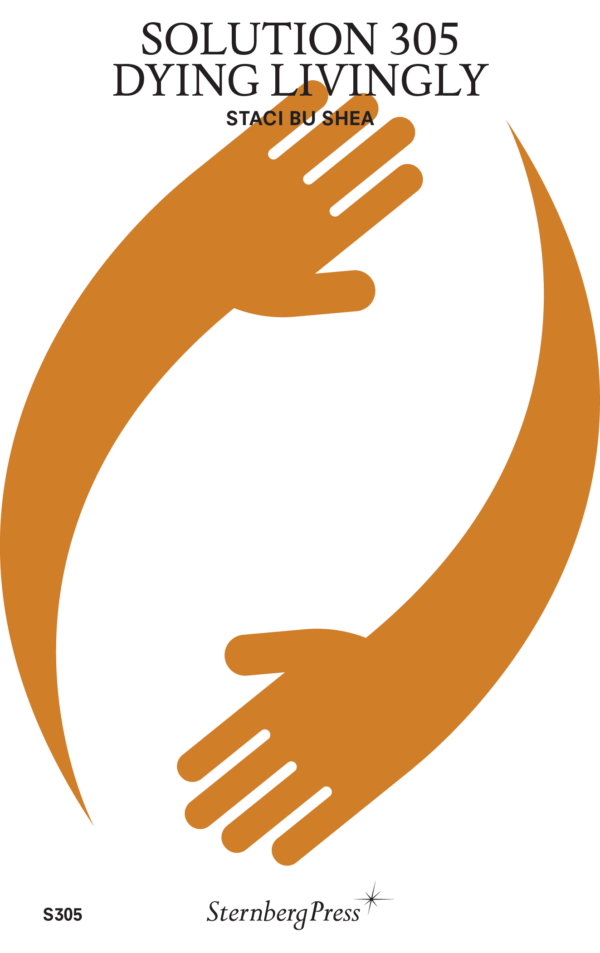
Solution 305 – Dying Livingly
A series of propositions and encounters in service to an aesthetic, critical, and poetic experience of living life led by death.
Part studious, part visceral, Dying Livingly is a collection of short essays written in the first few years of the author's holistic deathcare research and practice. With a focus on the truth of impermanence and the material cultures of death and dying, the writing reaches toward a future of compassionate, community-centered deathcare.
Death has been outsourced, medicalized, and commodified for over a century. Existing at a threshold of innovation and transformation today, death is not a plight to master or transcend but a reality of insistent change requiring our humble surrender. Working in tandem with the possibilities and limits of medicine, the holistic deathcare movement aims to support people and their communities in death literacy and phobia. It stewards both ancient and new practices in deathcare and centers social, political, and ecological imperatives for how we die.
If death is an amplification of living, the attention here is on bearing witness to life in and around the dying and the potential to contribute to a more vibrant culture of care. Living a death-oriented life is not simply for those and their loved ones navigating a terminal diagnosis and finite amount of time to live; it is for all of us. Death awareness leads to a valuing of life, which is urgently needed for justice, healing, and our livability.
With fervor and deep reverence, this collection demonstrates that what is needed above all is a presence—simple but challenging—that refuses to look away as life slips from our grip. In this light, the writing details lessons in what it means to be prepared for death but also impossibly ready. Death is a horizon that inspires us to live fully, with the vulnerability necessary in the transformative process of giving and receiving care.
Staci Bu Shea (born 1988 in Miami) is a curator, writer, and holistic death care worker based in Utrecht, the Netherlands, focusing on aesthetic and poetic practices of social reproduction and care work, as well as its manifestations in interpersonal relationships and daily life, community organizing and institutional practice.
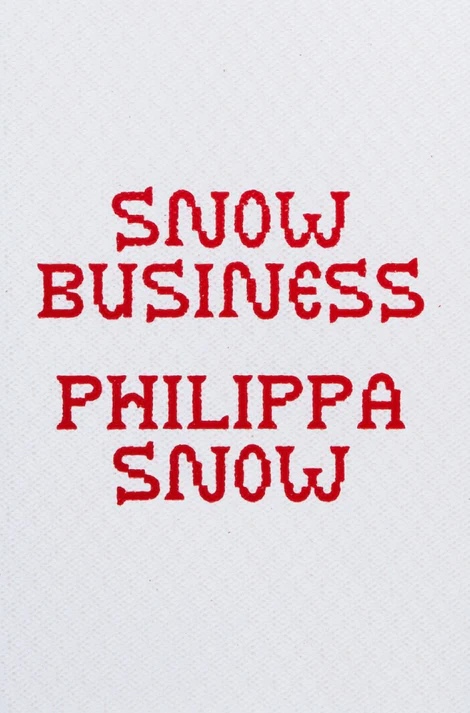
Snow Business
A collection of Philippa Snow's most celebrated writings, articulating with majestic precision the thorny, unbreakable bond between mass media, popular culture and art.
Snow Business marks Philippa Snow's emergence as one of the twenty-first century's greatest cultural critics. From the 2000s into the 2010s, reality television and "second-screen media," designed to play in the background while we look at phones, have proliferated, inaugurating the dumbient age. Celebrities have never been more ordinary; there have never been so many ordinary people who are celebrities.
A collection of her writing from the last half-decade, Snow Business articulates with majestic precision the thorny, unbreakable bond between mass media, popular culture and art. The memoirs of Pamela Anderson and the Kardashian sisters are just as worthy exemplars of "autofiction" as the writing of Olivia Laing and Annie Ernaux; Spring Breakers has succeeded in updating The Great Gatsby; and we are still afraid of Francis Bacon.
Snow has no interest in distinctions of high and low culture. If masterpieces of fiction, painting and cinema reflect back to us some vital and mysterious part of ourselves, mass-distributed popular culture does the same thing, and often with greater clarity and violence—if we are only brave enough to look. Fortunately, Snow does the looking for us.
Alongside her essays are also works of fiction, vignettes whose protagonists are actors, singers, child stars. These are strange, sometimes conspiratorial, and often nightmarish. Just as Snow Business can describe culture with stunning clarity, it can inhabit culture's moving parts, making it again something indescribable, a sensuous vision, a complete fever dream.
Philippa Snow is a writer whose work has redefined contemporary criticism through her analysis of popular culture, art, and media. Her work regularly appears in the Los Angeles Review of Books, ArtReview, The New Republic, The Nation, The White Review, and the Financial Times. She is the author of Which As You Know Means Violence (Repeater, 2022), Trophy Lives (Mack, 2024), and It's Terrible the Things I Have to Do to Be Me (Virago, 2025). Through her keen examination of reality television, celebrity culture, and high art, Snow illuminates the increasingly blurred boundaries between popular entertainment and artistic expression in the twenty-first century.
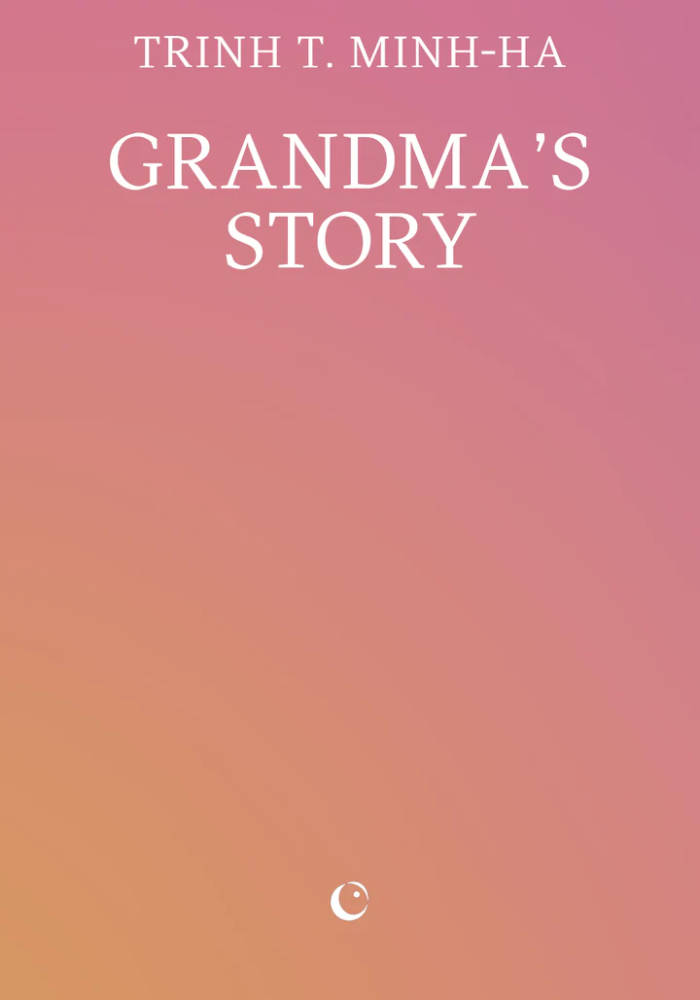
Grandma’s Story
‘May my story be beautiful and unwind like a long thread . . .’, she recites as she begins her story.
The storyteller is the living memory of her time: at once an oracle, weaver, healer, warrior, witch, protectress, teacher and great mother. Her powers are to do with passing on – not only the stories but transmission itself: ‘what grandma began, granddaughter completes and passes on to be further completed.’
In contrast to the idea that a story is ‘just a story’, pioneering postcolonial feminist theorist and filmmaker Trinh T. Minh-ha recodes ideas about truth and fantasy to tell a different story about power, civilisation, history, medicine and magic. Grandma’s Story shows how creative speech is connected to women’s powers of enchantment, drawing upon and speaking with storytellers including Theresa Hak Kyung Cha, Clarice Lispector, Maxine Hong Kingston, Leslie Marmon Silko and Zora Neale Hurston – all who may be known as ‘she who breaks open the spell’.
The story as a cure and a protection is at once musical, historical, poetical, ethical, educational, magical, and religious.
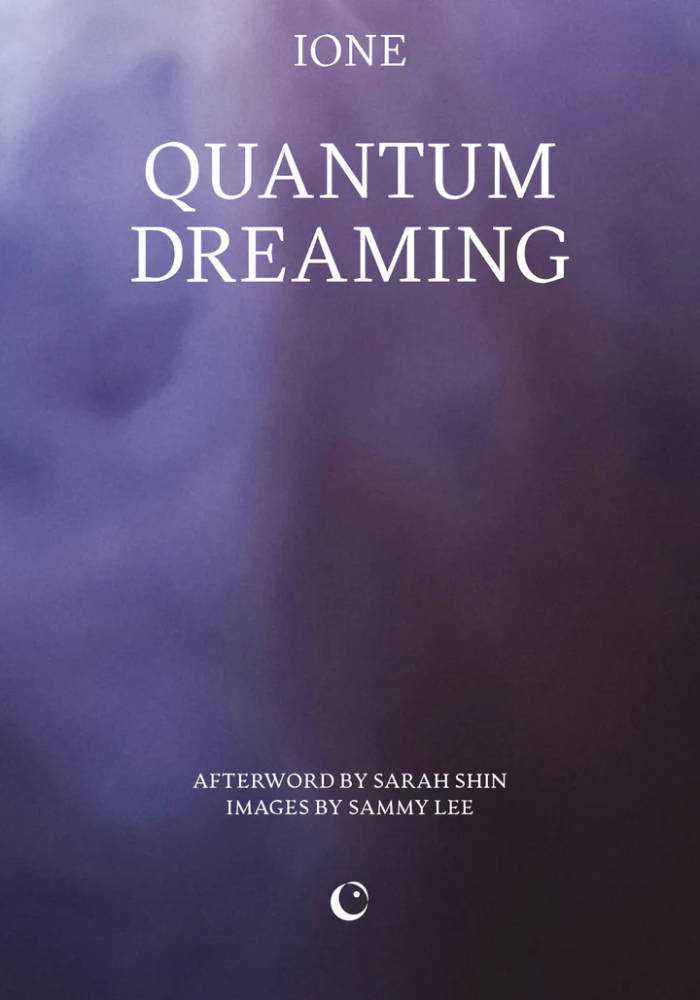
Quantum Dreaming
IONE is a Dream Keeper: a facilitator of dreams. Sharing this intimate part of our being, she believes, can be the start of new ways of being with one another.
Exploring the reality of the dream and the dream of reality over many decades has led IONE to appreciate the quantum nature of dreams. Weaving science and dream traditions from around the world together with her own memories and the dreams of her friends and community members, Quantum Dreaming shows that as we start practising awareness, our consciousness also deepens.
IONE and Pauline Oliveros’s shared vision of a harmonious, self-sustaining network of artists and dreamers led to the founding of the Deep Listening Institute. Quantum Dreaming similarly seeks a radical shift in our collective consciousness, across all states of dreaming and waking.
Afterword by Sarah Shin
Images by Sammy Lee

Par-delà étrange et familier
Dans cet ouvrage, malheureusement son dernier, Mark Fisher revisite des artefacts culturels familiers afin de cartographier les variétés de l’étrange dont ils sont porteurs. Longtemps sensible aux dimensions bizarre et omineuse qu’il devinait, sans les nommer, entre autres dans les œuvres de Lovecraft, les films de David Lynch ou les albums de The Fall, M. Fisher tente ici la synthèse essentielle d’un questionnement qui l’avait hanté, jusqu’à ce livre.
Avec son regard si particulier, celui du critique culturel tout à la fois pop et moderniste, puisant aux sources de la psychanalyse et du marxisme, Fisher se penche sur des objets sensibles pour y saisir les rapports entre présence et absence, entre ce qui devrait être mais n’est pas, ce qui ne devrait pas se présenter mais survient. C’est en compagnie de ces spectres — du titre d’un autre ouvrage — que nous sommes invités à voyager, pour questionner les formes mêmes de nos existences sociales, jusqu’aux frontières de l’étrange.

Suites décoloniales
Cet ouvrage se compose de « leçons » pour tenter d’anticiper les contre-feux institutionnels et se confronter aux effets qui accompagnent l’offre amoureuse d’une décolonisation de façade. Essayer de comprendre pourquoi ces stratégies trouvent des prises particulières dans le contexte français et montrer comment elles composent le chemin le plus sûr pour la poursuite – et même la nouvelle peau – de l’économie néolibérale.
Olivier Marbœuf est auteur, poète, performeur. Il a été directeur artistique du centre d’art l’Espace Khiasma. À travers ses multiples expériences et sa connaissance des milieux artistiques et culturels, il analyse les chantiers actuels de décolonisation de ces espaces.

Designing History - Documents and the Design Imperative to Immutability
Moving beyond the usual genres of form in graphic design’s canonical history, ‘Designing History’ proposes a model centred on bureaucratic instruments of identity, ownership, value, and permission: money, passports, certificates, property deeds, etc. It considers the implications of a design history of the document, where the designer shifts from being a practitioner of conventional design histories to become subject and agency of bureaucratic authority. The book is a revised edition of ‘Immutable: Designing History’ (2022) and includes an extended essay that contextualizes the project as a remapping of graphic design’s historical, pedagogical, and practical assumptions.

The Contemporary Condition - Contemporaneity in Embodied Data Practices
Cornelia Sollfrank, Felix Stalder
What parallels are there between a human pranayama practitioner and a migratory bird in heavily datafied environments? In Contemporaneity in Embodied Data Practices, two artistic field studies provide the starting point for a dialogical reflection on the entangling of diverse temporalities in body-related, datafied, and experiential practices. Shifting through biological, historical, and technological rhythms, Cornelia Sollfrank and Felix Stalder unfold their respective more-than-human frames of reference and arrive at specific forms of agency in the contemporary moment. Published in partnership with the Centre for Research in Artistic Practice under Contemporary Conditions at Aarhus University.

We, the Heartbroken
What do we do when the world breaks our hearts? Racial capitalism in the age of pandemic continues to crush ever more lives and spirits. Yet, we are told repeatedly to master, to overcome, to be resilient. Beneath this fragile pretence of coping, many of us have grown used to living with profound and fathomless sorrow.
In graceful prose, Gargi Bhattacharyya navigates collective grief and how it mingles with personal tragedy. Alongside love and joy, perhaps grief is what makes us human―and while its pain scrapes our wounds, its presence can help us renounce that which exists and build anew.
Heartbreak is the class consciousness of our times. So, it is up to us, the heartbroken, to learn again to heal—and remake the world.
"We, the Heartbroken reckons with loss and grief’s fullness and its surprising abilities to make us alive to one another … entranced by one another again. We are called upon to do this work, to allow for heartbreak to engender capaciousness and collectivity."
— Full Stop
Gargi Bhattacharyya lives and works in London. Their work includes writing on racism, racial capitalism, austerity and war.

To Be Determined: Photography and the Future
To Be Determined: Photography and the Future proposes a radical concept: that the photograph is as much an object of the future as it is of the past. Exploring a familiar medium with new eyes, this series of short essays asserts that photographic technologies are geared towards a world to come, not a world that has been.
The book proposes that artists and photographers who question photography’s capacities – to transform our relationship to time, rewire our perception, and describe our encounters with technology – can change our perception of our own agency and our capacity to see, think and act.

Image Text Music
In Image Text Music, writer and editor Catherine Taylor explores the place where the visual meets the verbal. Taylor riffs on and subverts Roland Barthes’ classic 1977 essay collection Image Music Text using his title as playful points of departure for her thinking about the nature of image-text works and the music that might be made at their intersection.
Taylor rejects overarching statements about medium or genre in favour of observations of the particular. In the process, she reveals ways of reading that are at once erotic and political, familiar and disorienting. The book asks: as we shuttle between linguistic and visual modes of meaning-making, what is the purpose of reinventing forms if not to reinvent ways of living?

Hello Chaos, a Love Story
Kitty, the cute and mute cartoon protagonist of Hello Chaos, a Love Story: The Disorder of Seeing and Being Seen, embarks on an ill-fated endeavour to win the eyes of her estranged counterpart Mickey in this genre-defying book by Charlie Engman. Through a cat-and-mouse narrative of unrequited attention-seeking, Engman unravels the contradictions of contemporary visual culture as Kitty and Mickey struggle to find each other and themselves amidst the chaos of imagery, technology, and mass production. Extensively illustrated with a wide range of images both original and found, this book attempts to tackle the beautiful, horny, horrible vulnerability of looking and being perceived.

Pirate Care: Acts Against the Criminalization of Solidarity
Tomislav Medak, Marcell Mars and 1 more
In many places around the world, the freedom to simply care for one another is under attack by the powerful, and acts of solidarity are being made illegal. In a moment of struggle defined by the rollback of social welfare programs, the criminalisation of migration, and the right-wing clampdown on bodily autonomy, radical networks of care are fighting back.
From volunteer rescue boats in the Mediterranean to underground labs for preparing gender-affirming hormones, from the sharing of copyrighted health knowledge to the provision of abortion and contraception, people are reclaiming the means to care for one another in defiance of a system that devalues and exploits the labour of care.
Against atomised despair, Pirate Care shows that fighting back isn't only about legal and legislative changes but also about organizing, direct action, and disobedient care.

To See In the Dark: Palestine and Visual Activism Since October 7
To see Palestine is to see the world. Since October 7th 2023, the forces of racial capitalism, settler colonialism and white supremacy have become all too visible in Israel's war on Gaza. Urban, networked Gazan youth have documented and shared their struggle with the world using social media strategies, derived from movements from Tahrir Square to Black Lives Matter.
In To See In The Dark, Nicholas Mirzoeff explores how these videos and photos transmitted and viewed outside Palestine, via platforms like Instagram and TikTok, enabled a dramatic switch in public opinion, leading to the global uprising against genocide.
In this groundbreaking analysis, he also connects the personal and the political via his own anti-Zionist Jewishness, weaving an autotheory of domestic, political and sexual violence. Through this exploration, he finds new collective anticolonial ways of seeing, combining online and embodied experiences.

Dysphoria Mundi: A Diary of Planetary Transition
A revolutionary book tracing the collapse of the paradigms that have organized the world for centuries.
In Dysphoria Mundi, Paul B. Preciado, best known for his 2013 cult classic Testo Junkie, has written a mutant text assembled from essays, philosophy, poetry, and autofiction that captures a moment of profound change and possibility. Rooted in the isolation of the COVID-19 pandemic, and taking account of the societal convulsions that have ensued, Preciado tries to make sense of our times from within the swirl of a revolutionary present moment.
The central thesis of this monumental work is that dysphoria, to be understood properly, should not be seen as a mental illness but rather as the condition that defines our times. Dysphoria is an abyss that separates a patriarchal, colonial, and capitalist order hurtling toward its end from a new way of being that, until now, has been seen as unproductive and abnormal but is in fact the way out of our current predicament.
With echoes of visionaries such as William S. Burroughs and Kathy Acker, Preciado’s theoretical writing is propelled by lyric power while providing us with a critical toolbox full of new concepts that can guide our thinking and our transition, cognitive emancipation, denormalization, disidentification, “electronic heroin,” digital coups, necro-kitsch. Dysphoria Mundi is Preciado’s most accessible and significant work to date, in which he makes sense of a world in ruins around us and maps a joyous, radical way forward.
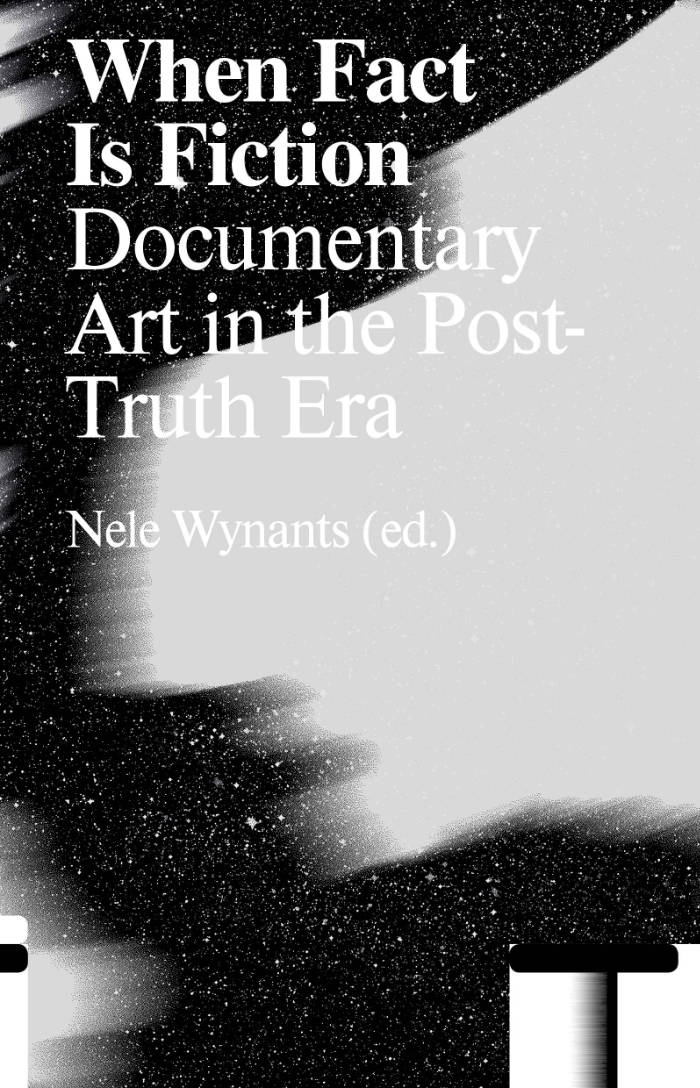
When Fact Is Fiction
What is the value of fiction at a time when fake news, alternative facts, and infotainment undermine the integrity of politics and media? This question is the common thread of When Fact Is Fiction. It brings together contributions by and about artists who probe the boundaries between fact and fiction. The ambiguous relationship between the documentary and the imaginary has been investigated and questioned within the arts for decades. The artists discussed in this volume deliberately blur the boundaries between what is generally known as ‘fiction’ and as ‘reality’. They share a fascination with the same problem: the impossible challenge of representing reality. Their artistic re-interpretation of oral and archival sources often has an explicit critical potential to rewrite history, rethink our present time or imagine possible futures.